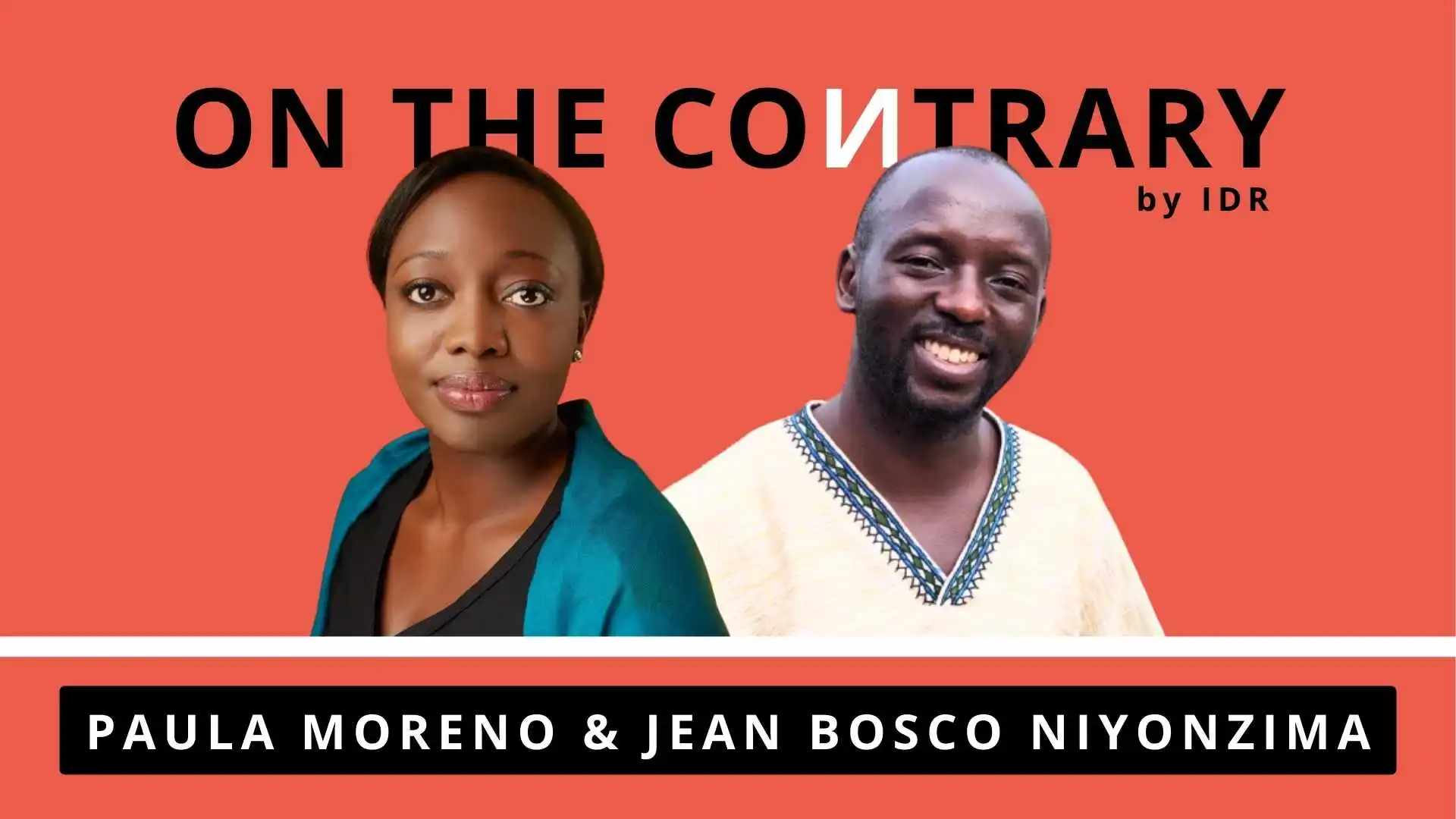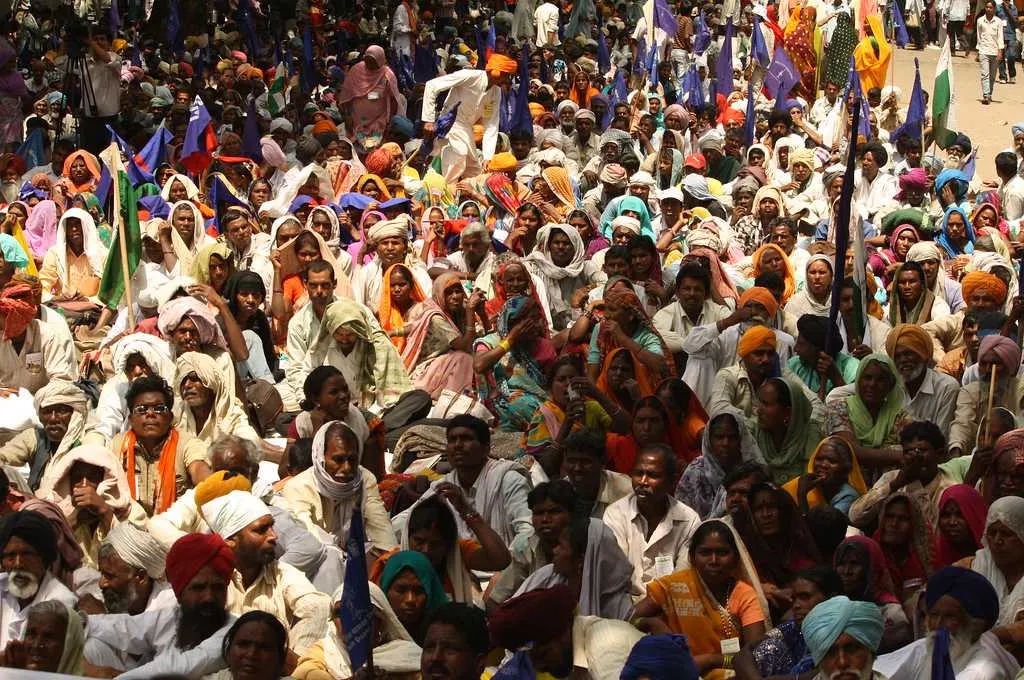Edited transcript of the episode:
0.50
Devanshi: When we talk about philanthropy, we usually focus on the tangibles—what’s being funded, where the money goes, and what results it delivers. But behind every outcome is a relationship: between funders and grantees, and between organisations and the people they serve. And relationships don’t thrive on metrics. They need time, trust, care, and space to hold the complex emotions that come with the work. So, what would it take to centre well-being—not just as a perk or an afterthought—but as a guiding principle of how philanthropy works? What does it take to create space for rest, for grief, and for reflection? And not just for grantee partners, but also for the funders themselves.

To unpack these questions, we have with us Mahendra Pandey and Steven Harris. Mahendra leads the forced labour and human trafficking team at Humanity United, where he supports grassroots worker– and survivor-led movements. Over the past 15 years, he has worked to advance the well-being of migrant workers, particularly in the Global South. He also founded Shramik Sanjal, Nepal’s largest migrant worker network, along with the Global Migrant Workers Network, mentoring emerging leaders across Asia and Africa. Steven is the vice president at Fetzer Institute, where he leads work on ecosystem transformation, helping leaders bring a values-based, inward-looking approach to social change. With a background in public policy, theology, and African American studies, he works at the intersections of faith, justice, and systems thinking.
So, I think before we jump into it, I’d like us to situate ourselves. To you both, what does well-being actually mean when it comes to philanthropy? What does it mean to you, and what does it mean for the work that you do? Mahendra, if you’d like to start us off.
02:50
Mahendra: Before I talk about what well-being means for philanthropy, [I would like to talk about what] well-being means for me. Well-being [for me means how I] take care of myself, [how I] treat people, [how I want to] feel loved, [and how I want to feel] kindness. It’s the same for philanthropy. What does that mean? That means it [should] not [be a] transactional relationship with our grantee and partners. We need to understand and listen to the challenges and the problem that our grantee and partners face. And [we should] not only [lessen the] burden on them, but also partner with them to [help] mitigate the challenges they’re experiencing. [We can do this by] addressing any problem they have been facing on the ground. We [should] take [an] empathetic approach and reduce [putting a lot of] burden on reporting, and should [be more] trusting [of the organisations]. They are the people who are doing the work on the ground. And who are we to ask [them] so many questions? That is [how I understand] well-being [in philanthropy]. There is already so much burden because of the situation they are in. And we [should] understand and respect that and also give [them] a little bit of space. And that’s what we have been doing.
04:20

Devanshi: Sounds like you’re talking a lot about giving the communities and the grantee partners that you fund agency and choice, and reducing the burden on them as well. Thank you. Steven, over to you.
04:29
Steven: I agree with all that’s been said. Well-being for me is a profound, holistic experience of flourishing in the fullest sense that an individual [can], in every capacity and in every area of life. They feel themselves, having the agency, the freedom, the dignity, all those things that ought to be accorded to humanity and what it means to be fundamentally human. And the reason I frame it that way is because I think that part of the shift I’m encouraged by is that philanthropy— understandably and in many ways rightly so—often focuses on the materiality of issues [and] material outcomes. [It focuses on] the material conditions of public and social life, and we all understand why that’s critically important. But I think the conversation about well-being is more holistic. And the way that I personally have approached this idea in my own life, and the way we approach it at Fetzer Institute, it’s suggesting that actually to flourish and to be well doesn’t merely relate to what one’s material condition and circumstances look like. It includes that, but it’s also [about] the inner life. It’s also interiority. It’s the immaterial aspects that really form and shape how we live, and how we inhabit our social imagery. And so, [well-being is about] flourishing in a more holistic sense that recognises that actually the inner life is the site from which material life and material engagement takes shape. So, I think well-being [helps us arrive] at that fuller sense.
06:12
Devanshi: Could you give us an example of what that looks like in terms of a funding decision? How do you fund this inner being, inner life?
06:23
Steven: We often think of philanthropy, again rightly so and particularly in a moment of deep material crisis and concern, [as material support]. What [is then the importance of] unrestricted operational support? Organisational support, resourcing, all of that is [also] critically important. In addition to that, what we’re exploring is what does it look like to not only fund in that kind of way, but then [also] fund in a way that invests in interior life? So that might include a retreat. That might include funding and resourcing for therapy. That might include funding and resourcing for physical health support [as well as] for mental health.
So, it’s [realising that] organisations need operational support. They wake up every day thinking about funding their work [and] funding the individuals who are committed to that work. And philanthropy has an opportunity to say, in addition to that, we also want to sustain the individuals who are doing that material work.
07:42
Devanshi: Mahendra, I know that you, in your approach, have had many moments where you’ve said we’re not asking for rapid response and rapid reporting on issues. We are asking people to stay safe. And that they invest in themselves. Can you tell us what that looks like and how you fund?
07:56
Mahendra: So, there are a couple of ways we fund. There is a stereotype in the funding landscape that philanthropists [come from certain geographies or places], that they are certain kinds of people, academics and PhD holders, [generally from the] Global North. But philanthropy is changing. I’m from Nepal, I’m from the Global South. We are already rooted in a community, [and know] what that community needs, and we have lived experience. We are close to the reality. And we listen [to the community] and we understand them. We have shifted from project grant to a general operating grant. That means our grantee and partners have more ability and more flexibility to spend their grant and their fund their way, rather than prescription by the philanthropy or funders.
Another thing we have also been practising [is] verbal reporting for some grantees [who are not] fully confident about reporting in English.
The second thing that we have also been doing: [Let’s say] an organisation asks us [for a] USD 200,000 grant. Then we ask them, how about we take USD 25,000 or 50,000 for well-being and care for the staff? [This can include things like] hiring therapists and going to a psychologist or even a meditation session. Another thing we have also been practising [is] verbal reporting for some grantees [who are not] fully confident about reporting in English because some of them work in a different language, and we wanted to make sure that language is not [a] barrier to work with them. And education or a degree [should] not be a barrier. So, if they would like to tell us what they have done [orally]—not just about what they’ve done but their experience–that’s perfectly fine to us. And then after that we have to go to our systems, and we make sure that we have a check-in call with our grantee and our partners.
10:01
Devanshi: That sounds incredible. Thank you both. And what does that look like for both of the teams that you work with, not your grantees, but your own teams in your foundations? What are the practices that you have in place for their well-being? How has that mindset shift played out within the foundations itself, and what did it take to get there?
10:22
Steven: Oftentimes, and understandably so in a way, we expect individuals to take care of that on their own time, right? Philanthropy may be historically expected as partners. “We’re deeply aligned. We like the work that you do. We want to resource you. We expect that you will stay healthy and do what you got to do on your own time.” And I think, organisationally, and then in addition to philanthropy, we’re recognising that actually we need to carve out space and time to commit to [well-being], to make sure that [it] is cultivated. The individuals are fortified and cultivated in such a way, organisationally, as we seek to go about this work.
And the institute itself has committed resources, time, and space during its routine and cadence to pursue these things and pursue these practices. Spiritual reflection, communal practices, individual practices, all of that is carved out in the space of a day or a week where individuals are encouraged to lean into that. Because the conviction is, again, that this supports the work that we do. And this is throughout the organisation.
11:28
Devanshi: That sounds great. Thank you. I was also taking notes for some things that we could apply to our organisation. Mahendra, what about you?
11:35
Mahendra: The way well-being and philanthropy conversations happen in the Global North and in the Global South is a bit different. And we [aim to] understand the ritual, cultural, and societal context about well-being in the Global South. What does that mean? For example, in the Global North, when we talk about well-being and mental health and healing, people refer to psychologists and therapists. And going to a therapist is the best tool available. That’s perfect. But at the same time, if you go [to] Kenya, South Africa, or Nepal, or India, [people] find healing and well-being in a different way. They have cultural rituals [that are community-oriented], [all the people in a] village come together [if there is] some sad news in the family, [they go to] music concerts and religious gatherings. I had a conversation with one of our partners [and the] finance officer of the organisation declined to approve his expense because he went to a musical concert instead of a therapist. And if that person [considers going to a concert as well-being] because of the art, culture, and music, why [is it not considered as well-being by the organisation]? And we [need to] break this stereotype, [and] understand some of the local context and cultural aspects [of the] community we work with rather than giving them [our] prescription. And also, of course, our resources and knowledge is limited, and we don’t know everything. But we are very mindful [of how we] think about [our] team and the organisation. If we [are doing] well, then we can also help others in a [better] way. That’s what we believe.
13:44
Steven: That’s really great. I just want to piggyback off of that. At Fetzer Institute, we are trying to hold the importance of that agency, and that capaciousness around how people think about their own health, their own journey, their own path, their own development. We centre the sacred as a critical groundedness for the work that we do. And so, what that has looked like internally is that each individual or part of the organisation is allotted spiritual development resources, and funds to pursue development in whatever path or tradition or outlet that is conducive to their own development. That looks like a number of different things. I love the example [Mahendra] raised about [that. For this] one person, going to this venue or this outlet might be how they pursue that. For another, it’s this. And both of them are supported and encouraged because they cultivate the same kind of inner capacity.
14:45
Mahendra: Thank you so much for emphasising that. And I would like to add one more thing. The end goal of well-being is [what makes us feel] loved and good. If any kind of approach you are taking [makes] you feel really good or empowered, that’s well-being.
15:16
Steven: Yeah. That’s good.
15:17
Devanshi: So how do you both make space for this kind of well-being, for burnout, for everything that your grantee partners or your teams might be experiencing—be it grief, or any kind of struggle—and still expect results?
15:32
Steven: The way I’ve sought to lead when at my best is to embody what it means to appreciate individuals showing up as their full selves. I think there was a philosophy of work. In many ways, I can reflect on my parents’ generation, perhaps. You kept certain things compartmentalised. So, if I’m going through tragedy, if my whole world is falling apart, when I show up to work, I need to be a different person. And that kind of divorcing of oneself, we’ve now realised, [is] one, not realistic, and two, not healthy. And so what I’ve sought to do is really encourage and want to embody what it looks like to show up as one’s full self, and recognising that when I show up around the table for the work that we do, it is a given and never questioned the reality that I’m committed to the work, that I’m around this table because I’m committed [to the] mission and vision. I know what my tasks are, and that’s a given. And at the same time, I’m showing up to that table bringing all of who I am. That means my own perspectives, my spiritual path, my spiritual journey, my struggles, my trials, my triumphs, and that’s all appreciated. That means, then, that we create relational space for individuals to be that and to do that. And so, around the table that I lead, we begin our time, one, with the practice, but then just having individuals share how they’re doing. When we were doing our mic test [for the episode], the question was, how are you feeling today? Those little things, I guess that’s what I want to emphasise. It’s not grand gestures. It’s often the little things that create the permission structure where people feel like [they] don’t have to hide the fact that [they are] dealing with all of this stuff.
17:15
Devanshi: What we’ve seen funders struggle with, is that, a deadline is still a deadline, and so then what does that mean? And from a position of power, how can you think about that differently?
17:31
Steven: That power differential and dynamic you mentioned is very real. And I think, in one sense, it can never be totally removed just because of what that dynamic is. I think we need to be honest about that. But there are certain things that you can do to mitigate that, and to really reflect more of a mutuality in a relationship that’s rooted in trust, in dignity, in agency, and respect. [There should be trust that] the organisations that philanthropic entities fund know the work that they’re doing. They know the communities that they’re serving. They know the work that they’ve been called to [do]. In many ways, I’d imagine that’s what put that individual organisation on that entity’s radar in the first place. So, I want to lean into that trust and lean in to that agency that I’m according because of that mutuality and respect that’s there.
Mutual respect and trust-based relationship go a long way.
Things are changing daily. I was going to say weekly, but no, things are changing daily. And the backdrop of the world that we’re confronting is complex. And as we are seeking to navigate it individually and organisationally, so do partners. And again, we need to trust that they are engaging and making shifts and seeking to give analysis and attention to the things that are critically important, just as we are. I think communication is always key. And so even with regard to the shifting nature of things, I think that, again, that mutual respect and that kind of trust-based relationship then goes a long way, particularly against the backdrop of an ever-changing context in the world.
19:02
Devanshi: You both have hinted towards this already, but I want to step away from my script for a second. If you wanted funders, donors, foundations globally to take away [a few] things that you practise, that you think would be helpful to social impact as a sector or to communities around the globe, what would that be? [What would] be tangible steps that people can start taking today to shift how they fund?
19:33
Steven: I think, really taking stock and reflecting and considering the whole person in the work [is important]. And so [going back to what] I started with about material versus interior. That if the philanthropic community would really take up and understand and lean into [the fact that] it’s not merely about the material conditions that we’re confronting, and we don’t want to treat individuals like that. We don’t want to treat organisations like that. But if we’re really trying to fortify individuals, we’re really trying to love humanity, we have to take a more holistic approach to what it means to be human, what it means to love and care for a person, [and] for a community. That includes the material conditions that circumscribe their lived experiences, but it includes much more than that. And [we need] to push funders in the philanthropic sector to really lean into what it [means] to explore that. That if a person is not merely the sum total of their materiality, they’re much more than that, then how do I show up and resource that? And that leaves one on a path to then exploring a lot of things that we’ve been talking about.
20:41
Devanshi: Thank you.
20:42
Mahendra: So for me one of the lessons, and also takeaways, is that the global philanthropy landscape could be [that] no matter what organisation you are working with [do not think of yourself as] the only one powerful. And [you have to see yourself as partners with] the grantee. You are real partners. [Maybe the grantees] have more power than [philanthropists] because they hold the knowledge, the experience, and they know the community and they do the work. Then the real power is with them.
Philanthropies need to hire more people from the global majority, more people of colour, people of diverse genders and people from LGBTQ identities.
Global philanthropies [need to understand that] power stays with the community, power stays with the partners, power stays with the grantee. And philanthropists are the agency to channelise resources in a responsible way. And the second thing is, [philanthropies need to] hire more people from [the] global majority, more people of colour, people of diverse genders and people from LGBTQ [identities]. Supporting that organisation and community [versus] hiring people from that community is sometimes different. Supporting can be [very well] intentioned. But sometimes just supporting them may not be good enough. And how we also [show] respect and trust is by hiring people from that community. And then, ultimately, [we should see it as a partnership] rather than just, just a transactional [relationship]. There are thousands of ways [in which] we can engage with our partners [and] the community, beyond grantmaking, beyond transactional things.
And also we [should have] honest conversations. Money is one part. And what are the other things I would like from my partners? For example, if I’m going to the field of any organisations to see their work and meet with their community, I want to be 100 percent clear that there is no effect on that grant. Whatever learning I will have, whether about success or failure, that should not impact the grant. And if it does, then I am not trusting the community.
23:06
Steven: It’s really powerful. I really appreciate that. I could add one more thing.
23:10
Devanshi: Yes, please.
23:11
Steven: Given the resourcing and the agency and the power that’s there, what I could lean into—[and] perhaps I haven’t considered [this] previously—[is] the history that we’ve been bequeathed, that’s come before us.
I think you’ll find that things like a spiritual world view, and love and faith, are powerful resources that really go to the fundamental roots of our human experience. And if the philanthropic sector would really open up and lean into that, I think they’d be surprised by what is there.
—
Read more
- Philanthropy must focus on India’s mental health crisis
- Measuring cross-border giving
- It’s a new era for mental health at work
- What is the future of philanthropy in our fractured world?
- A philanthropic guide for mental health and addiction
- 8 practices for a more emotionally just organisation






